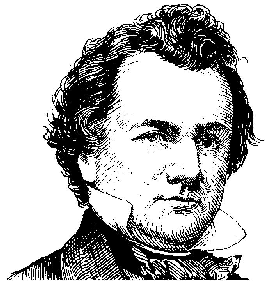|
Kansas-Nebraska Act
by Amanda Lewis
Return to Homepage
 The
only way that congress could make the Compromise of 1850 work
was to keep slavery out of congress, and that's just what congressman
Stephen A. Douglas did. In the 1850's American's were beginning
to want bigger and better things. They wanted roads, railroads
and train stations to bring more wealth to their smaller towns
(New Orleans, St. Louis, and Chicago). Although Douglas wanted
the main train station to run though his hometown of Chicago;
however, railroads could only go through land that had already
been politically organized and surveyed and the land has been
granted for railroads. So Douglas proposed a bill to organize
the land west of Iowa and Missouri, and the final bill that Douglas
had, also provided for Kansas and Nebraska. Unfortunately the
bill wouldn't pass because those states were closed to slavery
and the south wouldn't vote for it. This caused the Compromise
of 1820 to change to the Compromise of 1850, which had Kansas
and Missouri states free of slaves or not. So after nine months
of debate, the Kansas and Nebraska act passed in 1854. The
only way that congress could make the Compromise of 1850 work
was to keep slavery out of congress, and that's just what congressman
Stephen A. Douglas did. In the 1850's American's were beginning
to want bigger and better things. They wanted roads, railroads
and train stations to bring more wealth to their smaller towns
(New Orleans, St. Louis, and Chicago). Although Douglas wanted
the main train station to run though his hometown of Chicago;
however, railroads could only go through land that had already
been politically organized and surveyed and the land has been
granted for railroads. So Douglas proposed a bill to organize
the land west of Iowa and Missouri, and the final bill that Douglas
had, also provided for Kansas and Nebraska. Unfortunately the
bill wouldn't pass because those states were closed to slavery
and the south wouldn't vote for it. This caused the Compromise
of 1820 to change to the Compromise of 1850, which had Kansas
and Missouri states free of slaves or not. So after nine months
of debate, the Kansas and Nebraska act passed in 1854.
 |
|